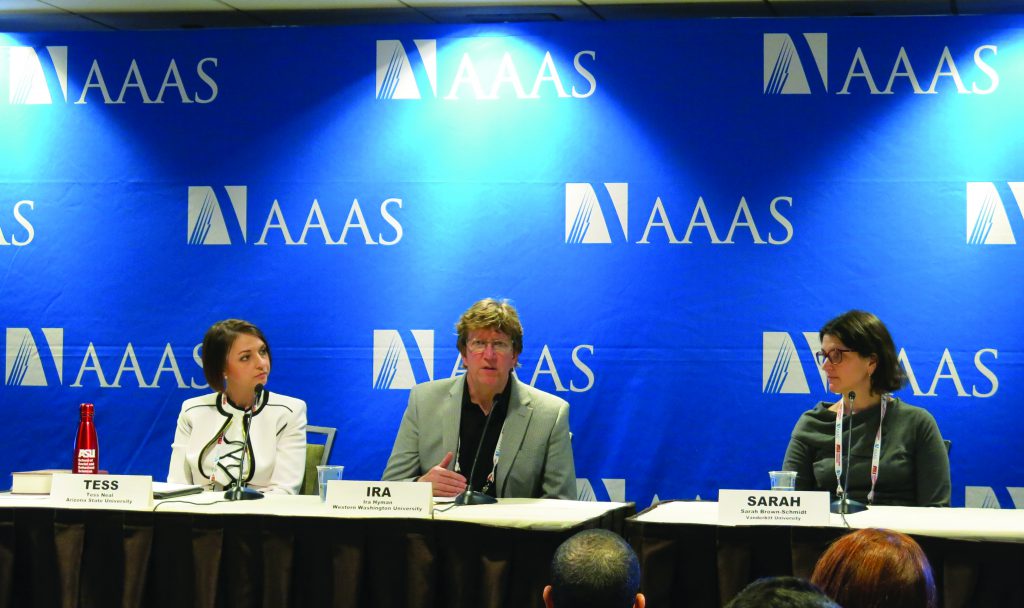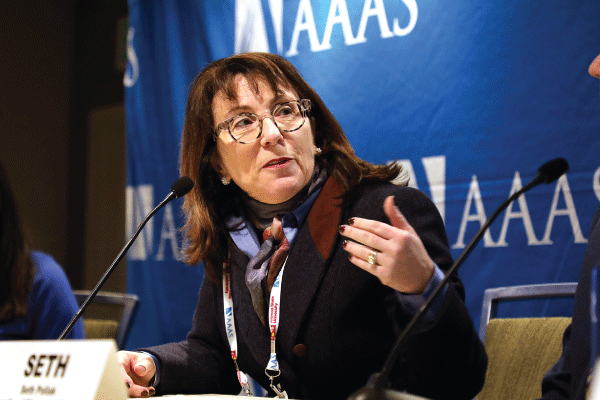Psychological Research on the World Stage: AAAS News Briefings Feature APS Members
At the American Association for the Advancement of Science (AAAS) meeting in February, APS members Tess Neal (Arizona State University) and Lisa Feldman Barrett (Northeastern University) highlighted intriguing findings published recently in Psychological Science in the Public Interest (PSPI) during a pair of press briefings.
Neal discussed the dearth of well-established psychological tools in the courtroom and Feldman Barrett explained the limitations of using technology to glean human emotion from facial expressions alone.
Panel 1: Psychology in the Courtroom
The first briefing, “Advancing Justice with Lessons from Psychology,” coincided with the online publication of the PSPI report titled “Psychological Assessment in Legal Contexts: Are Courts Keeping ‘Junk Science’ Out of the Courtroom?” The panel discussions began with a summary by Neal of the report’s findings.

“Each year, hundreds of thousands of psychological assessments are used in court to help judges make legal decisions that will affect a person’s life,” Neal told reporters. “We were able to clearly identify only 40% of these tools as having generally favorable scientific properties. This is a problem because bad psychological evidence may contribute to unfair legal processes and unjust verdicts.”
The problem is made worse, she continued, because the courts are not separating the good from the bad. “Even though courts are required to screen out ‘junk science,’ nearly all psychological assessment evidence is admitted into court without even being screened,” she said. According to the report, legal challenges to the admission of assessment evidence are rare, occurring in only about 5% of the cases reviewed. And only a third of those challenges succeeded.
The report’s finding were also publicized in the APS news release, The Verdict Is In: Courtrooms Seldom Overrule Bad Science, which was made available to reporters during the briefing. Two researchers who were not associated with the PSPI report, Ira Hyman (Western Washington University) and Sarah Brown-Schmidt (Vanderbilt University), also presented during the briefing.
Panel 2: AI’s Shortcomings in Deciphering Emotion
Feldman Barrett kicked off the second briefing, “Emotion Recognition Technology: Present and Future.” She presented findings from a July 2019 PSPI report, “Emotional Expressions Reconsidered: Challenges to Inferring Emotion From Human Facial Movements.” Her panel explored the increasing use of technology to detect emotion by studying people’s facial expressions. Feldman Barrett summarized how the PSPI report relates to this potential use of technology.

“The general punch line is, on average, when talking about adults in urban cultures, people scowl when angry about 30% of the time. This is what scientists call low reliability,” said Feldman Barrett. “So 70% of the time, adults do not scowl when they are angry; they do something else with their faces. And people also scowl when they are not angry. They scowl for lots of reasons.”
This means that scowling is not “the” expression of anger, she explained. It is “an” expression of anger that people will show in certain circumstances but not in others.
“People do not move their faces randomly, but they do move them in highly contextualized ways, so any AI [artificial intelligence] that is claiming to detect anger by looking for scowls has some real problems,” Feldman Barrett concluded.
Two other authors of the study, APS Fellow Seth Pollak, (University of Wisconsin-Madison) and Aleix Martinez (The Ohio State University), also served on the panel but discussed other related topics.
Both Neal and Feldman Barrett also presented their results in separate technical sessions.
John P. McGovern Award Lecture in Behavioral Science
During the meeting, Lisa Feldman Barrett also presented the 2019 John P. McGovern Award Lecture in the Behavioral Sciences. She was nominated for this award by APS and was selected by AAAS “for her role as one of the preeminent experts in the study of emotions.” Her talk, titled “Variation Is the Norm: Darwin’s Population Thinking and the Science of Emotion,” covered the nature of emotion from both psychological and neuroscience perspectives and how it emerged into a new field of inquiry called affective science.
The lecture, first delivered in 1990, honors outstanding behavioral scientists from around the world. The lecture was endowed by the John P. McGovern Foundation to enable scholars to learn and explore the accomplishments and challenges of the behavioral sciences. Dr. McGovern was an internationally recognized physician, scientist, scholar, educator, and humanitarian.





APS regularly opens certain online articles for discussion on our website. Effective February 2021, you must be a logged-in APS member to post comments. By posting a comment, you agree to our Community Guidelines and the display of your profile information, including your name and affiliation. Any opinions, findings, conclusions, or recommendations present in article comments are those of the writers and do not necessarily reflect the views of APS or the article’s author. For more information, please see our Community Guidelines.
Please login with your APS account to comment.